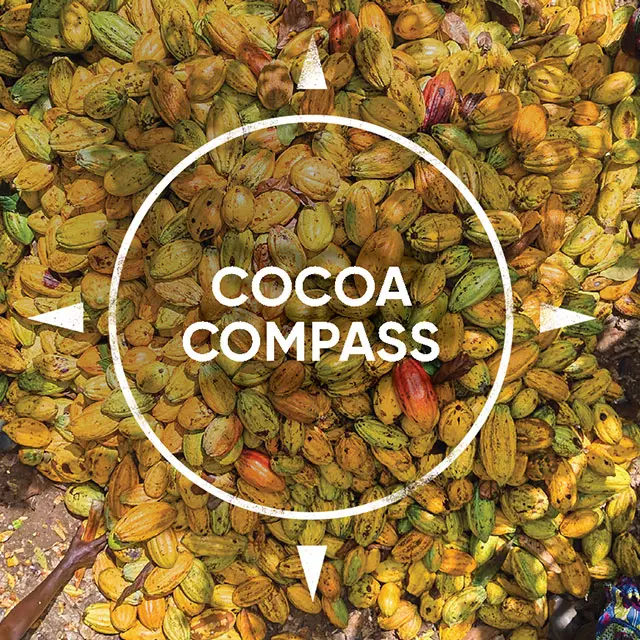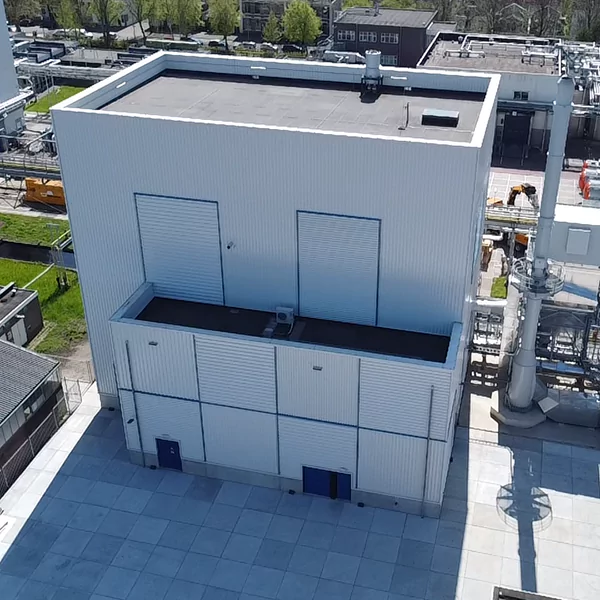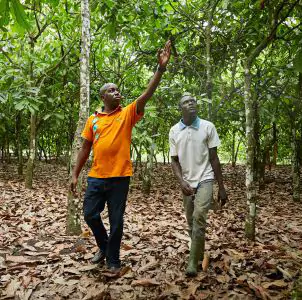Sustainability in cocoa
Building on two decades of supporting farmers and cocoa-growing communities, around the world, we launched Cocoa Compass in October 2019. It sets challenging goals to tackle the key issues facing the cocoa supply chain by 2030, with interim milestones for action in 2024.
Sustainable Cocoa Suppliers 2023 & 2024
Transparency and traceability are at the heart of our Cocoa Compass ambition. That’s why we have published the details of our direct, sustainable supplier network.
Cocoa Compass Stories
Apr 30, 2024
ofi (olam food ingredients), a global leader in naturally good food and beverage ingredients, says developments in data and technology – from granular deforestation mapping and child labor monitoring to AI-powered carbon measurement tools – are accelerating progress towards its Cocoa Compass sustainability ambition. It is also providing food and beverage companies with enhanced traceability and transparency ahead of new regulations in Europe and beyond.
The latest Cocoa Compass highlights based on 2022 data include:
- New analysis showing over 30,168 farmers in ofi’s cocoa supply chain are earning a living income[1], putting the business on track to reach its 2030 target of 150,000 cocoa farmers earning a living income.
- A 395% increase in the number of children receiving education support in 2022, compared to the 2018 baseline.
- A 15% increase in the number of households covered by ofi’s Child Labor Monitoring and Remediation System (CLMRS).
- 6 million trees distributed by ofi, working with its customers and partners, for agroforestry and income diversification, from 2018 to 2022.
- 79% of farms in ofi’s sustainability programs have been polygon mapped[2]
United States Agency for International Development (USAID), Indonesia Mission Director, Jeff Cohen, said: "We are proud to be working together with ofi and the Hershey Company to encourage cocoa farmers to adopt more sustainable agriculture practices—like diversifying their crops and allowing more trees to remain on their land—which will strengthen their resilience against climate shocks and improve their livelihoods[3].”
Mar 8, 2023
International Women's Day is a moment to celebrate the progress toward achieving gender equality and women's empowerment. But it's also a chance to reflect and consider what still needs to be done to help achieve gender parity worldwide.
Feb 28, 2023
As a human rights specialist at the Rainforest Alliance, I have learned that creating an environment where farming communities feel supported to speak up about abuses—without the threat of punishment—is more likely to result in cases of child labor being reported. And when that happens, the private and public sectors can work side-by-side with rural communities to not only mitigate abuses as they are uncovered but also take action to prevent them from happening in the first place.
Dec 19, 2022
Cocoa Compass, ofi’s ambition to make the future of cocoa more sustainable, has won the Sustainability Innovation Award at this year’s Food Ingredients Innovation Awards in Paris.
Nov 14, 2022
Gerry Manley, CEO of ofi cocoa and Chief Sustainability Officer of ofi
At last year’s COP26 climate summit, promises were made by governments and companies to go further and faster to tackle climate change. Now, as we reach the midpoint of COP27, the focus is on how to turn commitment into action and keep the 1.5 degrees climate ambition alive.
Jun 16, 2022
This week is International Day of the African Child, a day that raises awareness of the continuing need to improve education for children in Africa.
With our teams on the ground in many cocoa-growing communities across the continent, we see first-hand the issues that many African children face on a daily basis. Some have no school nearby or cannot provide the documents needed to enroll.
May 24, 2022
Child labor in cocoa has no one cause. There are often complex and deep-rooted cultural, social, and economic challenges at play.
Farmers cannot always afford to pay for farm labor, so their children help on the farm at weekends or after school. Some parents have no school nearby to send their children to or they cannot provide the documents needed to enroll them, such as birth certificates. Sometimes labor laws are misunderstood or poorly enforced.
May 4, 2021
Forests are vital to sustainable cocoa production. Not only do they help to improve biodiversity and mitigate against climate change, they also help to improve cocoa yields and raise farmer incomes.
Apr 21, 2021
Mondelēz International, Inc. (Nasdaq: MDLZ), a global leader in snacking, and olam food ingredients (ofi), a leading supplier of cocoa beans and cocoa ingredients, have today announced a new collaboration in Indonesia to create the world’s single largest sustainable commercial cocoa farm.
Apr 14, 2021
olam food ingredients (ofi), a leading supplier of cocoa beans and cocoa ingredients, today announces it has established child labour monitoring across its managed sustainability programmes.
Sep 21, 2020
Olam Cocoa, a leading supplier of cocoa beans and ingredients, today announces it has achieved 100% traceability of directly sourced cocoa across its global supply chain, a commitment first stated five years ago.
Jul 16, 2020
In October 2019 we launched Cocoa Compass, our sustainability ambition for the future of cocoa. With milestones for action in 2020 and 2024, it sets concrete goals for 2030 across our global, direct cocoa supply chain. These goals will help us achieve our vision of an environmentally positive, professionalised and quality focused cocoa supply chain comprising farmers earning a living income and whose children have access to education.
Jul 2, 2020
Recently, children in the cocoa growing communities we work with in Côte d’Ivoire came together to celebrate the International Day of the African Child, which raises awareness of the challenges children face in Africa, with a focus on improving access to quality education.
Jun 12, 2020
We’re committed to supporting not just the cocoa farmers we work with, but their families too. This World Day Against Child Labour, meet Augustin, our community development lead helping to roll out child labour monitoring and remediation across our cocoa supply chain, providing a vital step towards eliminating child labour and making sure all children in cocoa-growing communities have access to education.
May 18, 2020
Olam Cocoa has announced a package of support to provide personal protective equipment (PPE) and important medical supplies to cocoa farming communities tackling COVID-19 across Central and West Africa. Farming cooperatives, hospitals and health centres will receive much-needed equipment including face masks, surgical gloves, hand sanitiser, thermometers and hands-free washing stations.
May 1, 2020
Despite significant progress, child labour still occurs in the cocoa supply chain, often as a result of social and economic challenges like migration, poverty or lack of infrastructure. If there is no school nearby or parents cannot afford school fees, children can be kept at home to work on family farms and support household incomes.
Apr 3, 2020
Child labour in cocoa producing countries often stems from some really complex societal and economic challenges, from migration and poverty, to proximity to schools and community infrastructure.
Mar 13, 2020
It’s not news that most cocoa farmers in West Africa struggle to make a living income. And we know that this has a knock-on impact on things like deforestation as farmers are forced to encroach on forest land in search of fertile soil.
Mar 9, 2020
Empowering women is essential for having a positive impact on the future of sustainable cocoa. It’s not an easy task as they often face a lot of barriers to reap the fruits of their labour.
Mar 6, 2020
Child labour monitoring and remediation is set to be rolled out across Cameroon in the first programme of its kind by a cocoa company.
Feb 24, 2020
Deforestation has had a devastating impact on the Amazon and nowhere more so than in Pará, the state with the highest rate of deforestation in Brazil. Overall, 1.2 million hectares of forest have been lost there in last 5 years, mainly due to cattle ranching.
Feb 5, 2020
Child labour monitoring and remediation is set to be rolled out across Cameroon in the first programme of its kind by a cocoa company. The move forms part of olam food ingredients' (ofi's) global commitment to put children first by tackling child labour and helping more children attend school across its entire direct supply chain.
Jan 24, 2020
To mark the United Nations’ International Day of Education, Olam Cocoa has today announced plans to extend an innovative education programme that teaches school children from farming communities in Côte d'Ivoire about the devastating impact of climate change and deforestation.
Jan 9, 2020
The world’s food needs are skyrocketing. By 2050, there will be another 2 billion mouths to feed, placing a huge strain on agribusiness globally.
Jun 12, 2019
Parents in the cocoa farming communities of Côte d’Ivoire and Ghana, where over 65% of the world’s cocoa comes from, have the same concerns as parents around the world. Their preference is to have their children in school.
Apr 2, 2019
Indonesia has become my second home since I moved to its capital, Palu, in 2007 to lead a team of more than thirty people who form the heart of Olam Cocoa’s two-decade long operation in the country.
Mar 21, 2019
Agriculture is one of the largest drivers of this deforestation and the role of cocoa farming in particular has become the focus of much public and private debate.
Mar 8, 2019
The company today announced further commitments to end deforestation and forest degradation in its entire cocoa supply chain worldwide.




